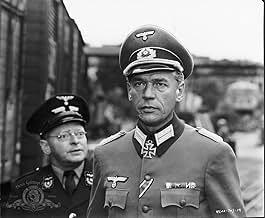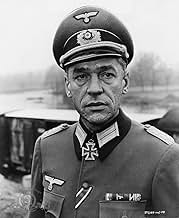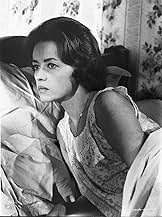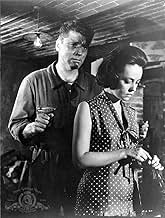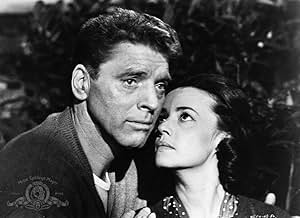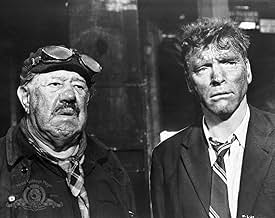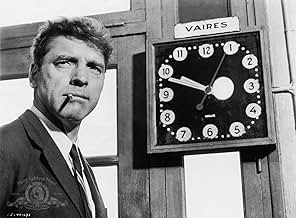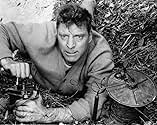Um coronel alemão carrega um trem com tesouros de arte francesa para enviar à Alemanha. A Resistência deve detê-lo sem danificar a carga.Um coronel alemão carrega um trem com tesouros de arte francesa para enviar à Alemanha. A Resistência deve detê-lo sem danificar a carga.Um coronel alemão carrega um trem com tesouros de arte francesa para enviar à Alemanha. A Resistência deve detê-lo sem danificar a carga.
- Direção
- Roteiristas
- Artistas
- Indicado a 1 Oscar
- 1 vitória e 3 indicações no total
- Didont
- (as Albert Remy)
- General Von Lubitz
- (as Richard Munch)
- Sergeant Schwartz
- (as Donal O'Brien)
- Pilzer
- (as Art Brauss)
- Major
- (as Jean-Claude Berco)
Avaliações em destaque
Seeing 'The Train' two days ago, what instantly came to my mind after watching was "wow!" Like most people here, to me this was a pretty exceptional film that really packs a punch in a way that not many films of its year, decade or even genre at this point of film history did. Truly powerful work that took risks and pulls no punches in a way that still has the ability to shock, no trivialising or sugar-coating here. Quite the opposite. As far as WWII films go, it is one of the best and despite being highly praised deservedly more people should know about it, it is really quite something and unlike a lot of films personally seen.
Maybe 'The Train' runs a little too long by about 15 minutes or so, which occasionally (emphasis on that word) affects the pace.
On occasions too early on, for my tastes Maurice Jarre's music score jarred a bit and like it belonged more in a comedy.
Conversely, there are so many strengths (which is actually pretty much everything else) and everything else is executed flawlessly. 'The Train' is quite masterful visually, the photography is full of atmosphere and played a huge part in making the train itself like its own character. Have never seen a train so cleverly, intimately and powerfully used. The French locations are incredibly well utilised, some of the best use of French locations for any film seen in a long time from personal view. On a technical level, the action with the train is enough to make the jaw drop today. Frankenheimer's direction is hugely accomplished and not since 'The Big Parade' as far as recent film viewings go has there been direction for any film that was this visually flawless. Most of Jarre's score works very well, when it becomes more subtle and more harmonious with the atmosphere it is quite hauntingly unsettling.
Script is very intelligent and thought-provoking, taut enough while allowing breathing space yet not rambling. The story is hugely compelling, is very intense especially the exciting action with the train and is emotionally powerful. Found myself quite moved and shocked at how much the more uncompromising moments (and there are many) wrenched the gut, haven't seen an ending this poetic in a while either. The characters are well defined and interesting. There are great performances from all, with Lancaster superb in one of his best performances. He tells so much with his face and eyes and could tell he meant every word with his line delivery, he is especially good in the last twenty minutes where words are few but one intensely feels his hurt and anger. Scofield has seldom been nastier or at times even frightening. Jeanne Moreau's role isn't huge but she is sympathetic in it and an atypically cast Michel Simon is very telling in his.
In summary, exceptional and one of the best WWII films. 9/10
Burt Lancaster is Labiche, a French station manager who becomes entangled in efforts to prevent German Colonel Von Waldheim (Scofield) from shipping hundreds of classic pieces of artwork out of Paris before the Allies re-take the city.
John Frankenheimer has done an excellent job putting every aspect of great storytelling together. The most essential part is the characters. Lancaster is absolutely great as Labiche. While the French want him to simply delay the train, Labiche is always more concerned about the human cost. Eventually, so many men are killed in the attempt to delay the train that he takes it upon himself to save the artwork so they did not die in vain. On the opposite side, Scofield makes a very believable, maniacal officer. He is purely obsessed by art. He's not your typical Hollywood "Nazi" officer; here, his one goal is not eradication of the Jews or whatnot - it's to steal millions of dollars worth of paintings for personal gain.
The French are played, for the most part, by young native French actors. Michel Simon plays a grizzled old engineer who tries to take matters into his own hands, at first, when Labiche won't aide the cause. Albert Remy (IS PARIS BURNING?) and Charles Millot (THE BATTLE OF NERETVA) are Labiche's resistance sidekicks, both passionate in their rather minor roles. Jeanne Moreau (THE VICTORS) makes a pretty big impression as a hotel owner who gets caught up the fight and elects to help Labiche, even though it will hurt her business and put her life in danger.
In support, the cast is made up of some very fine young actors who would become mainstream faces in later European war movies. Wolfgang Preiss (THE LONGEST DAY) makes an impression as the German Major commanding a rail yard, who is just simply trying to keep his facility running well and doesn't want to deal with Von Waldheim. The great Richard Munch (PATTON) has one strong scene as a German general, who knows the front line battle is more important than Von Waldheim's art. Howard Vernon (FROM HELL TO VICTORY) is the German captain with glasses in charge of the train; Donald O'Brien (DEADLY MISSION) is a very mean-looking Sergeant keeping Lancaster and Remy in check; and Arthur Brauss plays the German Captain interrogating the stationmaster.
The second essential portion of the story goes to the purely technical side of the production. First of all, there are some truly spectacular action sequences. Most of them were done with real locomotives, on life-size sets with authentic explosions. One huge, three-way head-on-collision is awe-striking and must have marvelous to see on the big screen. Lancaster performs all of his own stunts; jumping from control towers, running and catching moving trains - all, one would think, would be difficult for a man of 51 - but Lancaster doesn't show a bit of strain. A good deal of the action centers around simply moving trains and equipment through railyards, and it's all portrayed with acute attention to authenticity and detail.
At key moments, Frankenheimer uses his typical unorthodox filming technique to give the action a new perspective. The camera zooms in on every day objects, which actually have key importance at that one moment. He follows Labiche down a hallway with a handheld camera simply because it's the best way of showing how he gets to where he's going. All of this is trademark Frankenheimer direction, and it gives the film a sharp, cutting edge to its already awesome plot. Sincerely, standard direction with all of the same elements would really lessen the impact of the punch every other element packs.
A few side notes: the scenery is great; each town, village set piece, actual location or open countryside looks just like 1944 France. Maurice Jarre's rousing music score is great and is quickly becoming one of my favorite war movie themes, ranking with the works of Jerry Goldsmith, Ennio Morricone, Elmer Bernstein and John Williams.
I saw this movie on Turner Classic Movies, letterboxed about 1.66:1. This is apparently a transfer directly from the DVD. The print is excellent: the black and white image is sharp, the sound is clear and appropriately loud; and there is hardly a scratch or speckle to be seen. The DVD is probably worth buying for the commentary track it holds, but I have not yet viewed the disc.
THE TRAIN is an instant classic from the Golden Age of cinema, with every element working perfectly.
RATING: 10/10
The film begins in Paris, August 2, 1944
It's 1511th day of German occupation The liberation of Paris seems very close
Nazi Colonel Von Waldheim (Paul Scofield) decides suddenly to remove by train to Germany the best of Impressionist masterpieces His objective is clear: "Money is a weapon. The contents are as negotiable as gold and more valuable."
Mademoiselle Villard (Suzanne Flon) informs the Resistance of the shipment The Resistance reaction is to stop the train without damaging the national heritage "They are part of France." But stopping the train is not a simple task You can get killed especially if you are French and the train is German
Labiche (Burt Lancaster), the Chief Inspector of the French Railway System, is not impressed However, he never communicates his political, ideological, or nationalistic convictions, "For certain things, we take the risk," he said; "but I won't waste lives on paintings."
When an aged engineer, Papa Boule (Michel Simon), is accused of sabotage in spite of saving the train through the Allied's bombs at the risk of his own life, Labiche is forced into combat
It begins with a long sequence where an armament train and the art train are both trying to leave the yard in the morning As they are being moved back and forth across the tracks, the viewer knows that British planes will hit the yard in that moment at exactly 10:00 o'clock
New complications are introduced, but the central conflict always returns to an obsessive art lover against a man with no appreciation for art Labiche's only concerns is to slow down the Nazis keeping himself and his compatriots alive
Now, two forces control the film The first is Frankenheimer's cleverness to choreograph the real trains Frankenheimer and his cinematographers capture the heat of the engines, the noise and sound of the cars in motion, the fault in the oil line, the crushing strength implicated when the machines come into collision and the derailment The second force is Lancaster, the "headache" of the fanatical obsessed Colonel whose desire is to see the priceless paintings in Nazi Germany...
Você sabia?
- CuriosidadesBurt Lancaster performed all his own stunts in this movie. Albert Rémy also got into the act by performing the stunt of uncoupling the engine from the paintings train on a real moving train.
- Erros de gravaçãoWhen the German officer in the train thinks they've arrived in Germany, he takes a look at his map and we see Strasbourg (Alsace, France), the France-Germany border and Baaden-Baaden (Germany). During German occupation of France, Alsace and Strasbourg were annexed to the German Reich, i.e. this German military map should have shown a different border (100 km West) and Strasbourg should have been in Germany.
- Citações
Colonel von Waldheim: Labiche! Here's your prize, Labiche. Some of the greatest paintings in the world. Does it please you, Labiche? Give you a sense of excitement in just being near them? A painting means as much to you as a string of pearls to an ape. You won by sheer luck: you stopped me without knowing what you were doing, or why. You are nothing, Labiche -- a lump of flesh. The paintings are mine; they always will be; beauty belongs to the man who can appreciate it! They will always belong to me or to a man like me. Now, this minute, you couldn't tell me why you did what you did.
- Cenas durante ou pós-créditosOpening credits prologue: PARIS August 2-1944 1511th day of German occupation
- Versões alternativasWhilst the official run time is 133 minutes, the BBFC website has two separate entries, one with a theatrical 'U' rated certificate in 1964 running at 141 minutes 31 seconds and the other entry with a theatrical 'A' rated certificate in 1959 running at 90 minutes 37 seconds. Though the second entry seems incorrect due to the erroneous date of certification being 21 October 1959 (the film was being made in 1963 and is copyrighted in 1964) and a much shorter run time, the BBFC reference numbering is in sequence with the later video rated entries so it is unknown if this 1959 entry is a much shorter cut of this film or this is an error in the BBFC records. It is also not known if the 142 minute entry is a longer cut of the film that has simply not been since it's UK theatrical release in 1964.
- ConexõesFeatured in Film Review: Burt Lancaster (1968)
Principais escolhas
- How long is The Train?Fornecido pela Alexa
Detalhes
- Data de lançamento
- Países de origem
- Idiomas
- Também conhecido como
- El tren
- Locações de filme
- Acquigny, Eure, França(trains pile-up, 49°10'22.73"N, 1°10'44.84"E)
- Empresas de produção
- Consulte mais créditos da empresa na IMDbPro
Bilheteria
- Orçamento
- US$ 6.700.000 (estimativa)
- Tempo de duração2 horas 13 minutos
- Cor
- Proporção
- 1.66 : 1
Contribua para esta página



